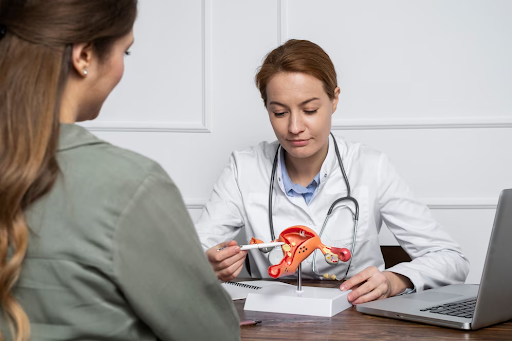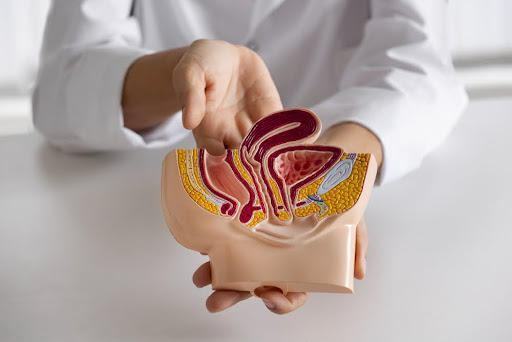
Hiatus Hernia Surgery in Mumbai (Nissen’s Fundoplication)
- Home
- Hiatus Hernia Surgery in Mumbai (Nissen’s Fundoplication)
Hiatus Hernia Surgery in Mumbai (Nissen’s Fundoplication)
Gastro-esophageal reflux disease (GERD) is recognized as a chronic disease requiring life-long medical management to prevent recurrence of symptoms with the potential for progressive injury to the esophagus or the food-pipe and end organ dysfunction. Most patients have limited disease which responds to diet and lifestyle modification and medical management. However, following cessation of medical therapy, symptoms almost always return. 10 to 20% of the patients progress to more severe form of the disease. Currently, laparoscopic hiatus hernia repair surgery is the only known means of the altering the natural history of this disease.
A hiatus hernia is one of the causes leading to GERD. Most patients with GERD have an associated sliding esophageal hiatal hernia. Vice versa may not be true and all patients with hiatus hernia may not have GERD. In addition to this, systemic collagen diseases such as scleroderma, involving the esophagus may cause GERD. Impaired gastric outlet emptying and sometimes operations that alter the normal lower esophageal competence mechanism may also lead to GERD.
Over the last 30 years there has been a marked increase in the number of people suffering from GERD. This can be attributed to increased consumption of tobacco, alcohol, large fatty meals and casual use of anti-secretory agents. Increased availability of upper GI endoscopy has also added to the increase in number of cases.
Types of hiatal hernia
Hiatus hernia is the herniation of stomach into the chest cavity through the esophageal opening in the diaphragm. There are three types of hiatus hernias:
- Sliding hiatal hernia – it is the most prevalent type of hiatal hernia. It happens when the esophagus and the stomach slide into and out of the chest via the hiatus. These types of hernias tend to be small and usually don’t pose any symptoms. Also, they don’t require treatment many a times.
- Para-esophageal hernia – this type of hernia is uncommon. This type of hernia happens when the stomach pushes via the diaphragm and does not push back. In most cases, it is not serious, but it poses a risk of blood flow to the stomach being blocked. In case this happens, it can cause serious effects, and it is categorized as a medical emergency. This type of hiatus hernia almost always requires laparoscopic hiatus hernia repair surgery.
- Mixed type consisting of both the above types.
Hiatal hernias happen after the abdominal cavity contents bulge through the esophageal hiatus of the diaphragm. There are several factors which lead to the development of hiatal hernia. These include:
- The enlargement of the esophageal hiatus because of age-related defects
- Depletion of elastic fibers in the phreneosophageal membrane as a person ages
- Increased abdominal, thoracic pressure gradient
- Obesity
Signs and symptoms:
- Heartburn and acid regurgitation. Heartburn typically increases on lying down or stooping down. Sometimes the pain may radiate to both arms and may mimic the pain of angina.
- Chronic sensation of a foreign body lodged in the throat.
- Difficulty in swallowing may be of varying severity. It may be mild to complete.
- Bleeding may usually manifest as dark colored stools and will be occult blood positive on stool test.
- Flatulent dyspepsia
- Some patients with chronic severe reflux may have respiratory symptoms due to aspiration. They may complain of wheezing, asthma and hoarseness and in worst cases may lead to idiopathic pulmonary fibrosis.
Complications of untreated GERD
If untreated of inadequately treated, GERD may lead to the following complications:
- Bleeding from ulcers
- Shortening of the food-pipe due to chronic scarring
- Narrowing or stricture of the food-pipe
- Barrett’s esophagus which is a pre-malignant condition and continued exposure to acid may lead to progression to adeno-carcinoma.
- Ulceration or perforation of the food-pipe.
- Lung complications like asthma, lung fibrosis
- Contraction ring in the lower part of food-pipe- Schatzki’s ring
- Cancer of the food-pipe
Diagnosis and investigations
When you start experiencing GERD/hiatal hernia-related symptoms, notify your doctor immediately. The doctor performing laparoscopic hiatus hernia surgery in India, will first take your medical history and physical examination. This will assist the doctor to have a further understanding of your medical condition. In addition to routine tests, the following are some of the diagnostic procedures used to identify hiatal hernias:
- Gastroscopy
In this procedure, the doctor uses a gastroscope to examine the inside of the patient’s body. The gastroscope is usually inserted into the patient’s mouth and 2. is used to detect any issues. Local anesthesia or sedative is used during this diagnostic procedure to assist the patient to relax.
- Barium meal X-ray
Also known as barium swallow test, it is a very effective and accurate way of detecting hiatal hernia. During the test, the patient is asked to swallow some barium solution, and once the barium moves through the digestive system, X-ray scans can then be taken to detect any problems.
- 24 hour pH manometry showing excessive reflux
Treatment
First line of treatment for GERD is always medical treatment before a laparoscopic hiatus hernia repair surgery in India. It must be tried for a minimum of 6 months. Lifestyle modification and medical treatment includes:
- To sleep with the head end of the bed elevated.
- To eat dinner early and not just before sleeping.
- To avoid stooping down as far as possible.
- Antacids must be taken half an hour before breakfast and dinner.
- Pro-kinetic agents may be given to increase the emptying rate of food-pipe and stomach.
- Weight reduction in obese patients
- Small frequent meals
- Avoiding tight fitting garments that may increase the intra-abdominal pressure
- Avoid smoking
Indications for Nissen fundoplication surgery in India:
- Persistent or recurrent symptoms and/or complications after 8 to 12 weeks of intensive acid suppression therapy.
- Recurrence of symptoms soon after cessation of medical treatment
- Increased exposure of the food pipe to stomach juices as documented in 24 hour pH monitoring
- Presence of a mechanically defective lower esophageal sphincter on manometry.
- Intractable esophagitis
- Ulceration or stricture formation
- High grade dysplasia or Barrett’s esophagus.
Laparoscopic Nissen Fundoplication Surgery In India
Laparoscopic hiatus hernia surgery in Mumbai or laparoscopic Nissen’s fundoplication surgery in Mumbai is a surgical procedure performed to repair hiatus hernia with the aid of a laparoscope as in any other part of the world. It is one of the most common anti-reflux surgeries being performed currently. The essential steps of a Nissen’s fundoplication surgery are:
- Patient is placed in supine position with both legs spilt apart and the table elevated to 30 to 45 degrees.
- Trocars are placed as shown in the figure.
- Dissection of both crura, identification and preservation of both the vagus nerves.
- Circumferential dissection of the food-pipe or the esophagus and ensuring adequate length of the food-pipe inside the abdomen.
- Suture or mesh closure of the crural defect (depending on the size of defect)
- Mobilization of the fundus of the stomach by dividing the short gastric vessels.
- Creation of a loose fundoplication by enveloping the anterior and posterior walls of the fundus of the stomach around the lower part of esophagus.
Results after Nissen’s fundoplication surgery in Mumbai and across the world
Studies have shown that in patients with good esophageal contractility and normal esophageal length, Nissen fundoplication is the procedure of choice. It has minimal side effects and leads to relief of reflux symptoms in 91% of patients over 10 years.
Advantages of laparoscopic technique
- Less pain and post-operative discomfort
- Patients are able to walk around after a few hours of surgery.
- Early discharge from the hospital. Most patients go home on the next day after surgery.
- Laparoscopic technique is advantageous in obese patients.
- Laparoscopy provides a much more magnified view of the operating field and hence better visualization
- Early return to work. Patients are able to get back to work much earlier.
Side effects or complications of the procedure
Potential risks and complications associated with laparoscopic hiatal hernia repair surgery in India and world over include:
- Failure of the fundoplication
- Severe swallowing problems
- Infection on the incision sites
- Injury to the esophagus and the stomach during the surgery
- Internal hemorrhage
- Chronic problems with belching and bloating
The patient should, however, notify the surgeon in case of worsening pain, drainage, swelling or bleeding around the incision site. Also, any abdominal pain not caused by flatulence or cramps should be reported. The patient should also seek medical attention for the bloating and swallowing problems continue for several months.
Post-operative care
- Diet – some diets will be restricted after undergoing laparoscopic Nissen’s fundoplication surgery in Mumbai and other parts of the world. Mostly, the patient is required to stay on liquids two to three days followed by soft foods for around two weeks after the surgery. Also, a patient can experience temporary difficulty in swallowing after the surgery. This is normal and should be expected to settle within a few weeks.
- Wound care – after undergoing laparoscopic hiatal hernia repair surgery in Mumbai, a patient can shower next day after the operation. We usually cover the incision with water proof dressings and these can be changed if they become wet or come off.
- Medications – as prescribed by the surgeon.
- Activity – laparoscopic hiatal hernia repair surgery in India doesn’t have significant restrictions postoperatively. Patients are advised to engage in their normal activities soon after the surgery, as long as it doesn’t hurt. Resuming normal activities as soon as possible enhances recovery. But, patients should avoid heavy lifting and strenuous activities for up to 12 weeks after their surgery.
- Driving – patients who undergo fundoplication surgery for GERD are usually allowed to drive after a week from surgery.
Hiatus Hernia Surgery (Laparoscopic Nissen Fundoplication) FAQs
- How do I prepare for hiatus hernia surgery?
After you have consulted the doctor, you will need to get certain investigations done. Once your investigations have been seen by the doctor and you are medically fit to undergo surgery, a date will be fixed for surgery. If you are on any blood thinner medications, they will need to be stopped atleast 5 days before the surgery. You can get admitted either one evening before or on the morning of surgery based on doctor’s instructions. You will also be guided about the cost of inguinal hernia repair surgery during this time.
- Will I get a lot of pain after surgery?
Degree of pain is much less after laparoscopic surgery . You will be covered with round the clock analgesics during the hospital stay. You will be able to walk around within 4 to 6 hours after laparoscopic surgery.
- When will I get discharged?
Most often patients get discharged on the day after their surgery. However, it depends on their clinical profile and condition.
- What are the precautions to be taken after hiatus hernia repair surgery?
It is advised not to lift any heavy weights and perform any strenuous activities. Patients will be on a liquid diet for two days after surgery after which they proceed to soft diet and then to normal home diet.
- When can I get back to work after hiatal hernia surgery?
You can get back to work within a week after surgery. However, it may vary depending on your clinical condition. Some patients may get back even earlier than a week after surgery and rarely some may take a bit longer.
- Can a hiatus hernia recur even after surgery?
Rarely a hernia may recur even after surgery. This depends on a lot of factors like the tone of the abdominal wall, size of defect, intra-abdominal fat content etc.
Laparoscopic hiatal hernia repair surgery cost in mumbai, india
The hiatus hernia surgery cost depends on many factors. Laparoscopic hiatal hernia repair surgery cost varies depending on the type of hospital, type of room and duration of hospital stay. Laparoscopic fundoplication surgery for GERD cost also depends on the duration of surgery. The cost of fundoplication surgery for GERD is usually covered by insurance in India and can be done by the cashless method too. For further details you are requested to contact the team.
Laparoscopic Nissen Fundoplication Surgery in Mumbai is performed by Dr. Aparna Govil Bhasker at the following hospitals:
- Gleneagles Global Hospital, Parel, Mumbai, India
- Saifee Hospital, Charni Road, Mumbai, India
- The Esthetic Clinics, Kandivali East, Mumbai, India
- Namaha Hospital, Kandivali West, Mumbai, India
- Suchak Hospital, Malad East, Mumbai, India
- Apollo Spectra Hospital, Tardeo and Chembur, Mumbai, India
- Apollo Hospital, CBD Belapur, Navi Mumbai, India
- MGM Hospital, Vashi, Navi Mumbai, India
- Currae Specialty Hospital, Thane, India
- Sunshine Global Hospital, Surat, India
Contact details
Mobile: +919819566618/ +919930922761
Email: info@bestbariatricsurgeon.org
Website: www.bestbariatricsurgeon.org , www.aparnagovilbhasker.com
Facebook: https://www.facebook.com/draparnagovilbhasker/
Linked in: https://www.linkedin.com/in/dr-aparna-govil-bhasker-82836b34/
About Dr. Aparna Govil Bhasker
Dr. Aparna Govil Bhasker is an accomplished Bariatric Surgeon and Laparoscopic GI Surgeon. Extremely passionate about her field of specialization. She completed her MBBS and MS in General Surgery in 2006, from Mahatma Gandhi Institute of Medical Sciences (MGIMS), Sewagram. Set up in 1967 by none other than the first health minister of India, Ms. Sushila Nayar, MGIMS is deeply rooted in Gandhian ethics. Read more


Surgeon in India


Bariatric Surgery: Pros and Cons

Types of Hernias and Their Treatment Options Explained
- Intra-Gastric Balloon Insertion Surgery
- Laparoscopic Adjustable Gastric Banding Surgery
- Gastric Sleeve Surgery / Laparoscopic Sleeve Gastrectomy
- Single Incision Sleeve Gastrectomy Surgery
- Laparoscopic Roux-en Y Gastric Bypass Surgery
- Laparoscopic Banded Roux-en Y Gastric Bypass Surgery
- Laparoscopic Mini Gastric Bypass Surgery /Omega Loop Bypass
- Laparoscopic Sleeve Gastrectomy with Duodeno-Jejunostomy Surgery
- Laparoscopic Duodenal Switch Surgery
- Laparoscopic Sleeve Gastrectomy with Duodenal Ileostomy (SADI) Surgery
- Laparoscopic Revisional/Redo Bariatric Surgery
- Metabolic Surgery for Diabetes
- Terms & Conditions
- Privacy Policy
- Sitemap
